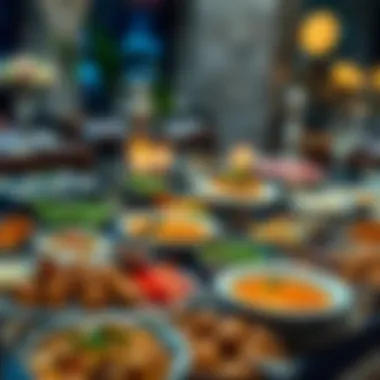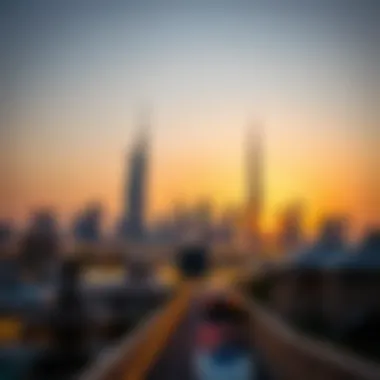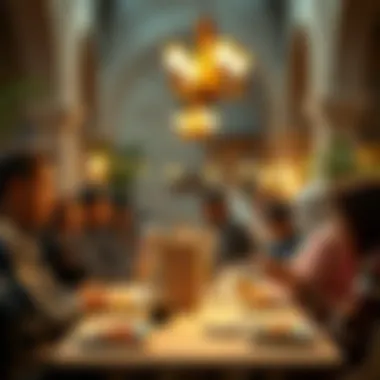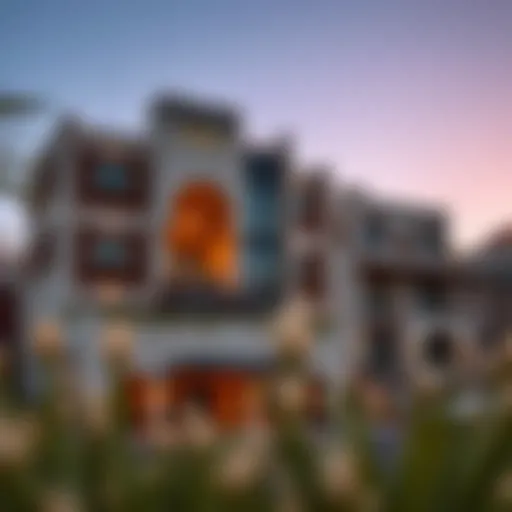Iftar Timing in Dubai: A Comprehensive Overview


Intro
As the sun dips below the horizon during Ramadan, the moment of iftar transforms daily life in Dubai into a tapestry of communal gatherings and cherished traditions. For many, this moment marks not merely the end of a day of fasting, but also the blending of culture, spirituality, and time-honored customs. The timing of iftar is meticulously observed across the emirate, resonating within families and communities alike. This guide aims to demystify when and how these iftar times are determined, highlighting the intricate balance of contemporary practices amidst Dubai's dynamic landscape.
Beyond the personal spiritual journey, the celebration of iftar intersects with various aspects of life in Dubai, including community interactions, lifestyle adaptations, and even the real estate market. In a city known for its rapid development and cosmopolitan nature, this month prompts a reflection on values and traditions that truly bind the community. The relationship between iftar timings and current market dynamics emerges as a subtle undercurrent, influencing everything from dining scenarios to property trends.
In examining the connections, this piece delves into the broader themes surrounding iftar, providing insights not only for residents but also for investors, buyers, and professionals looking to understand the rich cultural context behind what may seem like a mere change in mealtime.
Let’s venture further into unravelling the intricate layers that constitute iftar in Dubai, beginning with the market analysis.
Historical Context of Ramadan in Dubai
Understanding the historical context of Ramadan in Dubai is pivotal for grasping not only the significance of Iftar but also the deeper cultural fabric of this vibrant city. Ramadan, the holy month of fasting, holds immense importance in Islamic traditions. It is a time when millions of Muslims across the globe engage in reflection, prayer, and community bonding. In Dubai, this observance resonates powerfully, infused with local customs and a unique blend of cultural influences.
Origin and Significance of Ramadan
Ramadan traces its origins back to the 7th century, marking the month when the Quran was revealed to the Prophet Muhammad. As the ninth month in the lunar Islamic calendar, its significance is multi-faceted. Not only is it a period of fasting from dawn until sunset, but it also serves to foster a sense of spiritual discipline and community unity.
In Dubai, where modernity and tradition coexist harmoniously, Ramadan is observed with gravitas. The early morning meals before dawn, known as Suhoor, are essential in providing nourishment for the day ahead. As the call to prayer echoes through the city at sunset, the breaking of fast, or iftar, reflects a communal rite, where families and friends come together, often sharing food with those less fortunate. This reinforces the idea of charity, one of the core tenets of Ramadan.
“Ramadan is not just about abstaining from food; it embodies a holistic approach to spirituality, community service, and ethical living.”
The observance of Ramadan has continuously evolved over the years in Dubai, adapting to the city's rapid growth and diverse demographic. With a substantial expatriate population, the essence of Ramadan here can sometimes merge cultural practices, offering a fascinating tapestry where local traditions meet those from around the world. In this manner, the observance of Ramadan in Dubai effectively illustrates how tradition can coexist with contemporary life, enriching the overall ethos of the city.
Iftar Traditions Over Time
Iftar, the meal to break the fast, has historical roots that represent more than just food. It symbolizes commensality, generosity, and hospitality. Traditionally, iftar was a modest meal often consisting of dates, water, and perhaps a few local delicacies. However, over the decades, this practice has seen significant transformation.
Today, Dubai's iftar is a lavish affair in many places, showcasing culinary delights from various cuisines. Hotels, restaurants, and community centers often organize extensive buffets, featuring everything from traditional Emirati dishes to global fare, reflecting the city’s cosmopolitan nature.
The evolution of iftar traditions is also tied to advancements in technology. With apps and calendars available to announce iftar times accurately, residents can plan their meals accordingly, incorporating a blend of contemporary convenience into the ancient ritual.
- Modern Iftar Options:
- Rooftop gatherings with stunning views of the Burj Khalifa
- Iftar tents offering an ambiance of opulence
- Community-driven iftar events at mosques, emphasizing shared meals across different cultures
Iftar today is not just a time to feed the hunger; it’s also a moment of pause. It brings together families and friends, reinforces community ties, and fosters a sense of belonging—a quintessential part of what makes the Dubai Ramadan experience truly remarkable. As the sun dips below the horizon, the communal call to break the fast resonates, echoing a legacy that has stood the test of time.
Through understanding the historical context of Ramadan and observing how iftar traditions have evolved, one can appreciate the layered meanings that this period brings to the people of Dubai—an invitation to witness the city's heart and spirit.
Understanding Iftar in the Context of Islamic Practices
Iftar, the meal served at sunset during Ramadan, represents much more than just breaking a fast; it embodies a variety of cultural and religious significances. Within Dubai's vibrant context, understanding iftar is essential for grasping the deeper values that guide the community and shape daily interactions during this holy month. Each dusk, the anticipation builds as families and friends gather to share this ritual, highlighting unity, compassion, and gratitude.
Purpose and Meaning of Iftar
The primary purpose of iftar lies in its spiritual and communal characteristics. As Muslims complete a day of fasting from dawn until sunset, the act of breaking their fast with a date and water — traditionally followed by a larger meal — symbolizes renewal and gratitude for the sustenance provided.
Iftar promotes self-discipline and empathy for those in need. This meal serves as a communal gathering where neighbors become family, and friends gather around laden tables, sharing not just food but experiences and stories. It's about more than just filling bellies; it fosters connections while reinvigorating one’s faith.
As the sun sets, the call to prayer echoes across the city, marking the end of the day's fast. For many, this moment is laced with emotional significance, a reminder of community ties. The joy that fills the air as families come together paints a vivid picture of compassion and support, which is at the heart of the Islamic tradition.
Cultural Variations of Iftar Around the World
Iftar customs can vary widely across the globe, influenced by local traditions and culinary practices. In Dubai, you'll find traditional dishes like harira, a rich soup, or fattoush, a refreshing salad made with Arabic bread. However, the essence of iftar remains consistent: community and gratitude. Here are a few variations observed around the world:
- Middle Eastern Countries: Rich with spiced meats, stuffed grape leaves, and an abundance of sweets like baklava.
- South Asia: The aroma of slow-cooked biryanis combined with spicy samosas is common, reflecting diverse culinary traditions.
- North Africa: A predominance of couscous and tagines, showcasing a rich fusion of flavors.


"Iftar is a moment where the community comes alive, each dish telling its own story, and people binding through shared experiences."
Moreover, the way iftar is observed can vary based on cultural backgrounds. In some regions, it’s a strictly formal affair while in others, it may be a more casual gathering. This fluidity in practice showcases the adaptability of traditions, weaving a tapestry of cultural richness that spans globally, yet feels locally rooted.
Understanding iftar in Dubai entails appreciating how these various cultural practices interplay with local mores, reflecting a global harmony in the observance of this significant aspect of Ramadan. For investors and developers, recognizing these nuanced practices can be pivotal, facilitating the creation of community-centric spaces that enhance the lived experience during this vital time.
Iftar Timing Calculation in Dubai
Iftar timing calculation holds great significance in Dubai, particularly during the holy month of Ramadan. Knowing the precise moment to break the fast not only aligns with religious practices but also enhances the experience of community bonding and celebration. This timing, dictated largely by the setting of the sun, underscores the intersection of tradition, spirituality, and daily life in Dubai, making it essential to understand.
Role of Prayer Timings
In Islamic tradition, the timings of the five daily prayers are intricately linked to the position of the sun. Iftar marks the conclusion of the daylight fast and coincides with the Maghrib prayer, which occurs just after sunset. As such, the calculation of Iftar time requires careful attention to local sunset times. In Dubai, this is not merely about referencing a clock; it involves the adoption of various methods to ascertain the exact moment the sun dips below the horizon. The Emirate's diverse environment can influence these timings slightly, which is particularly notable in such a sprawling city.
"The Maghrib prayer signifies a pivotal transition from fasting to feasting, nudging the communal spirit of Ramadan in Dubai into full swing."
By keeping a close eye on prayer schedules, residents and visitors alike can partake in Iftar celebrations just as the sun sets, often accompanied by the call to prayer wafting through the air.
Astrological Considerations
The scientific aspects of astronomy play a role in determining Iftar timings. Knowledge of solar movements enables more accurate calculations, particularly in a city like Dubai where the skyline can obscure the view of the horizon. Monthly variations in sunset times due to the earth's tilt and orbit mean that accurate astrological data needs to be referenced. These calculations are not just a matter of convenience; they spiritually fulfill the requirements of fasting, connecting Muslims to the broader universe.
Understanding these astrological elements can enhance one’s appreciation for the practice. Moreover, during Ramadan, Islamic scholars and local religious leaders often provide insight and announcements regarding precisely when Iftar will take place, leveraging their understanding of celestial patterns to guide the community.
Technological Tools for Achieving Accurate Timings
In today’s digital age, technology plays a pivotal role in determining Iftar timings with high precision. Many apps and websites provide real-time data tailored to Dubai's specific requirements. Utilizing GPS, these platforms can adjust calculations based on the exact location within the city, ensuring accuracy. Popular apps such as Muslim Pro and Islamic Finder are go-tos for residents who want to ensure they break their fast exactly at the right moment.
- Real-time updates: Weather conditions and geographical factors can influence sunset timings; hence these apps often provide updates that account for such changes.
- Custom notifications: Users can set reminders to prepare for Iftar, allowing for seamless integration into their daily routines without added stress.
- Community features: Some platforms offer forums and social interactive features where community members can share experiences and recommendations concerning Iftar meals and events.
As such, the convergence of tradition and modern technology creates a framework that deepens the understanding of Iftar timings and enhances the communal aspect of Ramadan in Dubai.
Iftar Timing in Dubai for the Current Year
The significance of Iftar timing in Dubai for the current year cannot be overstated. As Ramadan approaches, residents and visitors alike find themselves tuned into the unique rhythm dictated by the fasting schedule. With precise timing becoming essential for many, it shapes not only daily routines but also community interactions and hospitality offerings. Understanding these timings aids in fostering a cohesive environment where everyone can collectively break their fast, reinforcing social bonds that are crucial during this holy month.
Daily Iftar Timings and Adjustments
In Dubai, daily Iftar timings change with the course of Ramadan, aligning with sunset each day. The exact time for breaking the fast can vary by a few minutes depending on geographic location and atmospheric conditions. In 2023, for instance, residents might observe that Iftar falls around 6:45 PM at the beginning of Ramadan but may shift to around 6:55 PM by the end of the month. Understanding these nuances helps individuals plan their meals, coordinate gatherings, and schedule prayers more effectively.
Adjustment practices include keeping an eye on local mosque announcements, using apps or online websites that convey the precise timings, or observing the sun's position. It’s not just about the clock; it is equally about embracing the spirituality of the moment. This punctuality ensures that everyone, from families to large communal events, can experience that first sip of water or morsel of dates together as the sun dips below the horizon.
“The sunset marks more than just a time to eat – it’s a moment of reflection and community.”
Projected Changes Over Ramadan
As with every Ramadan, changes are not restricted to mere timings; they resonate through the myriad of dining options available and the palpable shifts in social life. As the month progresses, restaurants and hotels ramp up their offerings, adjusting menus to feature traditional dishes appropriate for Iftar, while also fine-tuning their services to cater to the growing demand.
Community dynamics also evolve during this period. Early in Ramadan, many might struggle with early fatigue or adjusted routines, potentially causing earlier dine-out timings or rushed meals. As days roll into the month, residents may become more accustomed, facilitating larger gatherings and an overall increase in community-centric events. This evolution requires those involved in Dubai’s real estate and hospitality sectors to stay agile, adapting to the fluctuating patterns and needs that emerge day by day.
Through an understanding of these projected changes, stakeholders—from investors to service providers—can grasp potential opportunities, ensuring that their offerings resonate with the community's needs during Ramadan.
For a detailed understanding of sunset timings, many resources and apps can assist, including websites like IslamicFinder or local mosque notifications to keep everyone informed throughout this sacred month.
Cultural and Community Aspects of Iftar in Dubai
Iftar, the meal that breaks the fast during Ramadan, is more than just a routine; it’s a cultural cornerstone reflective of communal bonds and shared values in Dubai. The social fabric of the city during this holy month is tightly woven with the threads of tradition, hospitality, and togetherness, making iftar a pivotal experience for residents and visitors alike.


Communal Iftar Gatherings
During Ramadan, communal iftar gatherings become a heartbeat of the community. These events not only facilitate the breaking of fast but also foster a sense of unity among individuals from diverse backgrounds. Families, friends, and even strangers come together at large tables often filled with an array of traditional dishes—often larger than necessary, showcasing the value placed on generosity in the culture.
In Dubai, these gatherings can take many forms:
- Community Centers and Mosques: Many mosques open their doors to host public iftar meals. These events typically serve a mix of local delicacies and international cuisine, accommodating the multicultural demographic of the city.
- Corporate Iftar Events: Some organizations conduct large iftar events for employees and clients, reinforcing professional relationships and demonstrating corporate values of inclusivity.
- Outdoor Fasting Breaks: On balmy evenings, parks become vibrant hotspots for families to set up picnics, contributing to a relaxed atmosphere that encourages mingling and conversation.
The essence of these communal meals lies in the shared experience, where food becomes a medium for building relationships and creating lasting memories. As the sun sets, the rich aroma of biryani and dates fills the air—a sensory reminder of the shared joy of simply being together.
Impact on Community Dynamics
Iftar in Dubai transcends just nourishment; it significantly influences community dynamics. The essence of togetherness during this month brings about a plethora of positive effects that ripple through the social structure of the city.
- Strengthening Bonds: The act of breaking fast together helps in strengthening family ties and friendships, emphasizing the importance of community life. This collective act serves as a reminder that despite busy lifestyles, connections with loved ones should not be overlooked.
- Fostering Tolerance and Understanding: In such a diverse society, iftar serves as a platform for dialogue among different cultures. People share their backgrounds through their culinary traditions, promoting understanding and respect.
- A Unified Spirit of Giving: Ramadan is also a time for charity. Many individuals organize food drives to ensure everyone can partake in the iftar experience, showcasing a collective consciousness aimed at uplifting those less fortunate. This spirit of giving is contagious and inspires broader community initiatives.
"Community coherence grows in shared rituals like iftar, where cultural roots and modernity converge to create enriching social experiences."
In essence, iftar during Ramadan shifts from mere observance to becoming a crucial element which binds Dubai’s cosmopolitan society. It has evolved to not only honor traditional customs but also embrace modern communal values in a rapidly changing world. This aspect of iftar hardens the importance of relationships, kindness, and fostering unity—elements that define the city’s identity.
By understanding these cultural and community aspects, we can appreciate how Iftar goes beyond food, serving as an integral foundation in the community dynamics throughout the month of Ramadan.
Real Estate Implications During Ramadan
The month of Ramadan has a unique impact on Dubai's real estate landscape, presenting both challenges and opportunities that are worth examining closely. Understanding these implications allows investors, buyers, and real estate professionals to adjust their strategies effectively during this significant time.
Increased Demand for Hospitality Services
During Ramadan, the demand for hospitality services tends to escalate remarkably. Restaurants, hotels, and catering businesses see a noticeable uptick in their activities as residents and visitors alike seek to break their fast in celebratory environments.
- Increased Restaurant Reservations: Many diners prefer to enjoy iftar buffets or special meal arrangements available in hotels and restaurants. This influx can lead to fully booked venues, emphasizing the importance of early reservations.
- Catering Services Boom: With many families opting for home gatherings, catering services become crucial for delivering elaborate iftar meals. Local businesses that offer large platters or traditional dishes often find themselves busier than ever.
- Tourism Surge: If tourists visit during Ramadan, demand spikes for hotels that provide tailored experiences, including iftar meals. This can greatly benefit operators who know how to harness the influx for business growth.
The hospitality sector not only thrives but adapts, leveraging Ramadan’s unique social elements to offer special promotional deals and exclusive menus tailored for the month.
Shifts in Property Utilization
As Ramadan unfolds, the use of certain properties also transforms to accommodate the season's needs.
- Residential Adjustments: Many families reorganize their living spaces for communal iftar gatherings. Spaces that were unused or purely for show often get repurposed into dining and entertainment areas.
- Commercial Property Adaptations: Businesses operating in areas with high foot traffic prepare for a transformative experience throughout Ramadan. For example, retail spaces might shift to feature more traditional food products or decorations appealing to the cultural observance. This not only meets consumer demand but also enhances the shopping experience.
- Temporary Rentals Rise: During the holy month, some landlords may notice a spike in short-term rental interest, particularly from those looking to enjoy the festivities without committing long-term. Many developers adapt by offering flexible leasing options.
In this period, the significance of real estate in Dubai is magnified, making it essential for stakeholders to understand how to navigate these shifts effectively.
"Ramadan is not just a time of fasting; it’s an opportunity for the real estate sector to engage and adapt, reflecting the community's spirit."
Understanding the dynamics of hospitality demands and property utilization changes during Ramadan allows real estate investors and professionals to stay ahead of the curve, tapping into the unique rhythms that this month brings. It's a vital touchpoint for those looking to make informed, strategic decisions.
Lifestyle Adjustments for Residents
During the holy month of Ramadan, the dynamics of living in Dubai shift significantly. Fasting from dawn until dusk creates not just spiritual reflection but also necessitates various changes in lifestyle. Understanding these adjustments is paramount for residents as they navigate through daily routines, whether they're lifelong inhabitants or new faces in the city.
One of the most immediate adjustments involves meal timing. Iftar—the evening meal that breaks the fast—becomes a focal point. For many, this is not merely about sustenance; it embodies a sense of community. Families gather to share meals, and restaurants often prepare lavish buffets, enticing residents to partake. The anticipation leading up to Iftar, marked by the call to prayer, can create a palpable excitement in the air.
However, the changes extend beyond dining hours. Residents might find that their energy levels fluctuate. With long daytime fasting, a careful balance between rest and activities during the day becomes essential.
"When the sun sets, it’s like the whole city breathes a sigh of relief; but before then, patience is key."
Adjustments also touch on social interactions. Many people engage in evening gatherings, as the night becomes a canvas for community bonding. Despite this, residents might face challenges in juggling commitments.


Adapting to Iftar Schedules
The set time for Iftar is non-negotiable during Ramadan, and its significance resonates deeply. For residents in Dubai, adapting to these schedules is crucial for both personal and professional life. Traditional practices dictate that iftar happens at sunset, but with technological advancements, residents can easily check local prayer timetables via apps or websites dedicated to Islamic practices. Ensuring faith and technology work hand in hand exemplifies modern adaptability.
Furthermore, it's not just about when one can eat; it's also about managing preparation. Home cooks might start early to have meals ready right as the sunset approaches. Grocery runs become strategic, with markets often brimming with shoppers looking for dates, fruits, and traditional dishes. This rush highlights the importance of planning ahead.
Balancing Work and Fasting
The interplay between fasting and work is an intricate one. Many businesses in Dubai tend to adjust their hours during Ramadan, acknowledging the needs of their employees. Shorter working hours allow individuals to maintain a healthy balance between professional responsibilities and personal spirituality. However, the adjustment still requires careful navigation.
For some workers, fatigue can set in as the day drags on without food or drink. Developing a rhythm — understanding when to tackle the most demanding tasks and planning breaks to rest — can aid significantly in maintaining productivity. Supporting colleagues who may be fasting also helps create a respectful environment, fostering mutual understanding.
In summary, lifestyle adjustments during Ramadan are more than mere changes—they're an opportunity for residents in Dubai to engage deeply with their community and faith. Embracing these shifts not only enhances one's experience during the holy month but strengthens the communal bonds that make living in such a vibrant city unique.
Health Considerations on Iftar
Understanding health considerations related to iftar is vital during Ramadan, especially in a cosmopolitan city like Dubai where eating habits can significantly shift. As the sun sets, communities gather to break their fast, but it’s not just about food; it’s a time to reconnect and recharge. Health is a top priority, necessitating a closer look at what goes onto the plate and how one can ensure their well-being during this holy month.
Proper nutritional guidance and awareness regarding hydration are crucial. Many individuals overlook how fasting during daylight hours impacts their bodies. Thus, it's pertinent to assess these considerations to promote overall health and prevent potential complications.
Nutritional Guidance for Iftar Meals
Working out what to eat at iftar isn’t just about filling the stomach after hours of fasting. It’s also about giving the body what it needs to recover and thrive. The meal should ideally include a mixture of nutrient-rich foods that help to replenish energy and provide essential vitamins.
Here are some tips for crafting a well-balanced iftar:
- Start Slowly: Begin with dates and water. This traditional method not only aligns with customs but also helps to gently prepare the body for heavier foods.
- Balance Your Plate: Focus on incorporating lean proteins, healthy fats, and complex carbohydrates. Grilled chicken or fish, along with brown rice and plenty of vegetables could be a perfect choice.
- Avoid Heavy Fried Foods: While delectable at times, dishes that are deeply fried can lead to sluggishness. Instead, opt for items like baked or grilled options.
- Explore Variety: Introduce local or seasonal fruits and vegetables to your meals. Perhaps try out some roasted eggplant or a fresh tabbouleh made with parsley, mint, and tomatoes.
Moreover, maintaining portion control is essential. It may be tempting to overindulge after a long day of fasting, but moderation can keep energy levels stable, avoiding the mid-evening slump.
Hydration and Energy Management
Equally important is how one manages hydration as you break your fast. The long stretches of abstaining from water can lead to dehydration, fatigue, and even headaches. Here’s how to stay on top of fluid intake during Ramadan:
- Hydrate Gradually: Don’t try to make up for lost fluids all at once. Instead, sip water or herbal teas in small amounts throughout the evening.
- Electrolytes Matter: Consider drinks or foods that can help restore electrolytes lost during fasting. Coconut water or even simple salts added to foods can be beneficial.
- Limit Caffeine and Sugary Drinks: It’s easy to reach for sodas or coffee, but they can lead to increased thirst later. Stick to more hydrating options like water or fresh juices.
- Plan Your Water Intake: Set reminders to drink a certain amount of water between iftar and suhoor. For example, target to consume at least 2-3 liters during the non-fasting hours.
Keeping hydrated will not only help in overcoming fatigue but also enhance one’s mental clarity in the bustling Dubai atmosphere.
Final Thoughts
In the end, the approach to health during the iftar period can play a significant role in how one feels physically and mentally. With the right planning and a balanced mindset, individuals can truly enjoy the spirit of Ramadan without compromising their health.
Looking Forward: Future Trends Related to Iftar in Dubai
As Dubai embraces modernity while holding onto its rich traditions, the future of iftar is set to evolve significantly. Given the vibrant and diverse landscape of the city, understanding these trends is critical for residents and investors alike. The merging of technology and culture indicates a shift that could enhance the experience surrounding iftar.
Technological Innovations in Timing and Consumption
With advancements in technology, the ways in which communities observe iftar are changing. Smartphone applications now play a vital role in determining precise iftar timings. Users can access apps that provide real-time updates on prayer times, which is crucial as the timing slightly fluctuates daily throughout Ramadan. These applications often utilize GPS technology to ensure accurate local timings.
Furthermore, online platforms allowing for pre-ordering iftar meals are becoming increasingly popular. Restaurants and food delivery services, such as Talabat and Zomato, are responding to the demand by customizing their offerings for Ramadan. Early bird discounts and special iftar deals entice customers while ensuring they can break their fast conveniently and quickly.
"Adoption of technology has made iftar more accessible, blending tradition with convenience."
This fusion of tradition and modernity also promotes healthier eating habits. Nutritional information provided in these apps educates about breaking fast with wholesome meals, guiding users towards better dietary choices. Armed with knowledge, individuals are more equipped to manage their health while enjoying the spirit of Ramadan.
Evolving Cultural Practices
Cultural practices surrounding iftar are also undergoing transformation. The participation of non-Muslims in iftar gatherings is on the rise, fostering community bonds and intercultural dialogue. For instance, hotels and restaurants are increasingly offering iftar experiences that are open to all, creating spaces where diverse groups can come together to celebrate and learn about Ramadan customs.
Moreover, traditional communal iftars are sprouting in neighborhoods, driven by grassroots initiatives. Local mosques and community centers host gatherings that not only provide meals but also serve as platforms for cultural exchange. These events allow different communities, including those from various expatriate backgrounds, to share their own traditions regarding fasting and feasting.
The notion of sustainability is also gaining traction. Many restaurants and organizations are now focusing on eco-friendly practices during Ramadan, such as reducing food waste and using biodegradable packaging. This growing awareness reflects an effort to respect the month’s spiritual essence while acknowledging contemporary environmental concerns.



